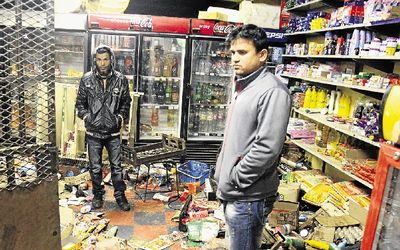Councils can be encouraged to embrace diversity
by Loren B Landau,
2015-04-24 05:43:17.0
THE past weeks’ violence came as no surprise to anyone who has followed the persistent demonisation and denigration of foreigners in townships.
Xenophobic violence neither began nor ended in 2008 — hundreds of people have been killed since then in isolated incidents and organised melees.
Recent events have nonetheless startled our leaders and national conscience. Amid much hand-wringing and head-hanging are quick condemnations and appeals for tolerance.
One suspects these are geared more to assuaging middle-class guilt and diplomatic tensions than genuinely combating xenophobia or the violence it begets.
Indeed, beneath the appeals for tolerance are calls for closure: African National Congress secretary-general Gwede Mantashe wants refugee camps; others call for tighter border controls, bans on foreign business and land ownership or bans on foreigners.
Even President Jacob Zuma was careful to say we must respect those who are "legally" in the country, suggesting an open season on others.
These "solutions" are politically savvy. For a government struggling to keep the poor on its side, such populist manoeuvres help divert attention from structural inequality and employment.
If implemented, these controls would do little to boost wages or job numbers, but rallying behind them is politically expedient and rational. So is the violence that has rocked the country.
Only by realigning institutional and political incentives can we effectively counter exclusion and xenophobic violence.
The attacks’ deep roots may be in generations of discrimination, the migrant labour system or persistent poverty. Yet many places — including many in SA — face these challenges without violence.
Outbreaks occur where governance systems fall short. Part of the problem is rooted in how we select and support our leaders.
Ward councillors, or some of them, are the only directly elected officials and the only ones who must meet constituents face to face to be elected.
Few know their MPs or mayoral committee members. If they know anyone, it is the councillors, who face the firing line of popular discontent but are poorly empowered to address gripes.
With almost no budget or legislative authority, they are held responsible for problems they have no hope of resolving.
Faced with perennial shortfalls of services, dwellings and jobs, is it any wonder local leadership allows and abets the scapegoating and appropriation of foreign-owned shops, houses or goods?
With new resources to distribute and a demon to blame, they come out winners.
There are concrete ways in which we can encourage local authorities to plan for and include diverse populations within their communities.
Providing a budgetary bump to constituencies that register new migrants — domestic and international — and providing them with services means that new arrivals bring resources, not competition. Population dynamics are poorly predicted and budgetary support is all but absent.
Participatory budgeting and planning are valuable and democratic, but they too tend to exclude newcomers and other marginalised groups. Improved collection and use of population data in planning processes could better anticipate where housing or service needs will be most acute and allow a proactive response rather than waiting for protests.
Identifying, prosecuting, or at least marginalising leaders who actively exclude on the basis of nationality, race, gender or language may cost some political points, but can also rapidly shift incentives away from violence.
Talk of institutional and technocratic reform does not ease our collective consciousness. To this end we can continue our marches, publicity campaigns and impassioned speeches.
However, we must address institutional incentives that foment conflict. Whereas tightened border controls and encampment will only foster underground economies and harden social divides, institutional reform will lead to improved efficiency, better service delivery and safer communities.
• Landau is the South African research chairman for mobility and the politics of difference at the African Centre for Migration & Society, Wits University.

Pakistani nationals stand in their Dobsonville shop looted by residents who were angered by constant blackouts. The government can quell xenophobic violence by restructuring incentives for migrants, the writer says. File picture: SOWETAN
THE past weeks’ violence came as no surprise to anyone who has followed the persistent demonisation and denigration of foreigners in townships.
Xenophobic violence neither began nor ended in 2008 — hundreds of people have been killed since then in isolated incidents and organised melees.
Recent events have nonetheless startled our leaders and national conscience. Amid much hand-wringing and head-hanging are quick condemnations and appeals for tolerance.
One suspects these are geared more to assuaging middle-class guilt and diplomatic tensions than genuinely combating xenophobia or the violence it begets.
Indeed, beneath the appeals for tolerance are calls for closure: African National Congress secretary-general Gwede Mantashe wants refugee camps; others call for tighter border controls, bans on foreign business and land ownership or bans on foreigners.
Even President Jacob Zuma was careful to say we must respect those who are "legally" in the country, suggesting an open season on others.
These "solutions" are politically savvy. For a government struggling to keep the poor on its side, such populist manoeuvres help divert attention from structural inequality and employment.
If implemented, these controls would do little to boost wages or job numbers, but rallying behind them is politically expedient and rational. So is the violence that has rocked the country.
Only by realigning institutional and political incentives can we effectively counter exclusion and xenophobic violence.
The attacks’ deep roots may be in generations of discrimination, the migrant labour system or persistent poverty. Yet many places — including many in SA — face these challenges without violence.
Outbreaks occur where governance systems fall short. Part of the problem is rooted in how we select and support our leaders.
Ward councillors, or some of them, are the only directly elected officials and the only ones who must meet constituents face to face to be elected.
Few know their MPs or mayoral committee members. If they know anyone, it is the councillors, who face the firing line of popular discontent but are poorly empowered to address gripes.
With almost no budget or legislative authority, they are held responsible for problems they have no hope of resolving.
Faced with perennial shortfalls of services, dwellings and jobs, is it any wonder local leadership allows and abets the scapegoating and appropriation of foreign-owned shops, houses or goods?
With new resources to distribute and a demon to blame, they come out winners.
There are concrete ways in which we can encourage local authorities to plan for and include diverse populations within their communities.
Providing a budgetary bump to constituencies that register new migrants — domestic and international — and providing them with services means that new arrivals bring resources, not competition. Population dynamics are poorly predicted and budgetary support is all but absent.
Participatory budgeting and planning are valuable and democratic, but they too tend to exclude newcomers and other marginalised groups. Improved collection and use of population data in planning processes could better anticipate where housing or service needs will be most acute and allow a proactive response rather than waiting for protests.
Identifying, prosecuting, or at least marginalising leaders who actively exclude on the basis of nationality, race, gender or language may cost some political points, but can also rapidly shift incentives away from violence.
Talk of institutional and technocratic reform does not ease our collective consciousness. To this end we can continue our marches, publicity campaigns and impassioned speeches.
However, we must address institutional incentives that foment conflict. Whereas tightened border controls and encampment will only foster underground economies and harden social divides, institutional reform will lead to improved efficiency, better service delivery and safer communities.
• Landau is the South African research chairman for mobility and the politics of difference at the African Centre for Migration & Society, Wits University.























Post a comment